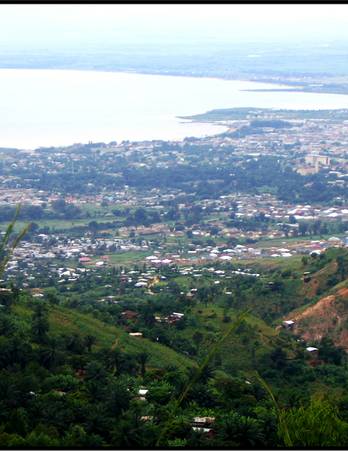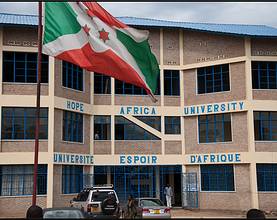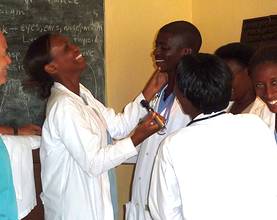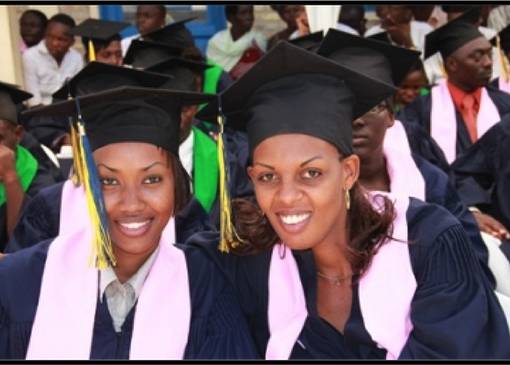
Bujumbura, Burundi. Photo from What might missionary-educator life look like in Bujumbura, Burundi at HAU? (World Harvest Mission at Hope Africa University. Accessed 10/2/2013. 8:26 AM).
Models
There are perhaps as many models for helping as there are universities in Africa. I hope through this forum to learn more from other readers of the variety of options and discuss what may or may not be effective.
Much of the pioneer work in post-secondary education in Africa was done by starting bible colleges. Faculty were most often not traditional US academics with advanced degrees (apart from seminary degrees). Many of these schools have become universities, but in doing so struggle to attract sufficient master’s and doctoral staff to meet true university accreditation requirements.
At the other extreme, I think that history shows that support of US based graduate training for African academics often ends in brain drain.
Christian (and secular) volunteerism has proved helpful, but some options for Americans with private African universities can waste and abuse short-term and long-term donations of money, talent and time. Short-term and mid-term experiences of inadequately prepared individuals, often facing language barriers and finding students at a level below what they expected does not use resources wisely. Frustration leads to broken relationships, inadequately educated students and damage to the careers of volunteer faculty.
Options that twin partner institutions in the United States with African universities have been particularly prevalent in (secular) medical education. However, American secular universities are not international charities. In many twin programs experienced faculty rarely spend extended periods of their careers teaching in Africa and much of their effort is directed toward supervising visiting American students.
The new Clinton Foundation Human Resources for Health partnership in Rwanda brings health care faculty from leading US universities for up to one year (though faculty can renew). The goal is to create more than 500 medical specialists for Rwanda in the next 7 years. However, it is not clear how senior the full-year visiting faculty are and this partnership is extremely expensive. To learn more click here.
Again in a secular framework, Fulbright scholarships have supported American faculty for up to a year. European governments have done the same, as has the Wellcome Trust. Long term Wellcome Trust grants have added to research in Africa, often training African academics.
One Christian agency placing professors internationally, including within Africa is Global Scholars (http://www.global-scholars.org). They have placed over 230 Christian scholars from over 50 academic disciplines in scores of public universities in 34 nations since 1988. In sub-Saharan Africa these nations include Nigeria, The Gambia, Cameroon, Uganda, Rwanda, Botswana and South Africa. It has not used the team model.

Hope Africa University. Photo from Hope Africa University (World Harvest Mission at Hope Africa University. Accessed 10/2/2013. 8:26 AM).
After beginning a program of the twinning type for a secular institution (now established with rotating faculty and trainees), I have decided to explore the longer-term Christian team vision. I am gathering a team for Hope Africa University in Bujumbura, Burundi through World Harvest Mission (www.whmathau.com).
In 2003 Hope Africa University had 110 students. Today it has 5,700 including 300 medical students spread over 6 years and the beginnings of a dental and pharmacy program. The need is great. Most indigenous faculty are adjunct faculty. Burundi is recovering from years of genocide, civil war and the flight of skilled workers. Half of the population is under 16.

Medical Students at Hope Africa University. Photo from Hope Africa University (World Harvest Mission at Hope Africa University. Accessed 10/2/2013. 8:26 AM).
In the past, the university has asked for short term professorial help via partner denominations and the American charity, Friends of Hope Africa University (www.haufriends.org). Now it is partnering with World Harvest Mission (www.whm.org) in finding longer-term medical and non-medical faculty. WHM is sending one all-medical team to teach and treat at a remote campus. It is gathering a second medical and non-medical team of expatriate professors to teach at the main campus in the capital (interested parties may apply!).
I encourage readers who know of other successful models to report them in this space. The need to respond is compelling. But we must to do it well. One size will not fit all.
Finally, I would like readers to prayerfully consider their own place in responding to this need.
- Are you willing to help construct an academic environment in American institutions that allows peer academics to respond to this need without making career-ending choices?
- Are you willing to consider spending a portion of your career in Africa?
- Are you financially willing to support those who may be willing to go?
For you know the grace of our Lord Jesus Christ, that though he was rich, yet for your sake he became poor, so that you through his poverty might become rich. — 2 Cor 8:9
I know that the Lord secures justice for the poor and upholds the cause of the needy. — Ps 140:12

Hope Africa University Graduates. Photo from Hope Africa University (World Harvest Mission at Hope Africa University. Accessed 10/2/2013. 8:26 AM).